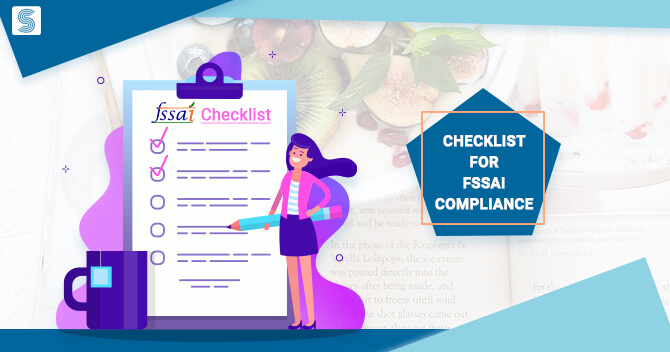Complete Checklist for FSSAI Compliance and Penalties Provisions

Dashmeet Kaur | Updated: Jan 16, 2020 | Category: FSSAI
The food industry has rapidly flourished over recent years. Many food outlets like restaurants, cafes, eateries have occupied every street and corner of India. Though it seems to be a potential business model, one cannot overlook the FSSAI provisions that one needs to abide. Therefore, the Ministry of Health & Family Welfare administers FSSAI to ensure a precise implementation of the FSS Act, 2006. So this blog will guide you about the checklist for FSSAI compliance and the penalties imposed in case of failure to comply with regulations.
Table of Contents
What is FSSAI Compliance?
The regulatory body of the Food Safety and Standard Authority of India prescribes science-based standards for articles of food. The checklist for FSSAI compliance also lies down numerous rules and regulations in regards to distribution, manufacture, import, storage, and sale of food. Thereby, FSSAI assures that the citizen of our country only consumes wholesome and safe food.
Also, Read: Requirements and Process to Start a Tiffin Service Business
Primary Objective of the Food Safety and Standards Act
Food Safety and Standards Act (FSSA), 2006 obligates all food business operators to adhere to certain FSSAI compliances. The fundamental compliance is to obtain FFSAI license and function under the FSS Regulations, 2011. To commence the activities of farming, manufacturing, selling, retailing, labelling, the food business operators must acquire the FSSAI license first. The sole objective of the Act is to certify the safety, hygiene, and sanitary standards of food products offered by FBOs. Thus, safeguarding the interest of society.
General Provisions for Food Business Operators
The Food Safety and Standards Act, 2006, render an explicit checklist for FSSAI compliance that every food operator must conform. Let’s take a look at the provisions for articles of food as well as for its packaging and labelling:
- Use of food additive or processing aid: No food article should contain any food additive or processing aid until it is in correspondence with the provisions and regulations under FSS aid.
- Renounce of contaminants and toxic substances: As per the Act, no article of food should have an excess of contaminants, naturally transpiring toxic substances or heavy metals.
- Discard the use of pesticides, veterinary drugs and antibiotic residues: No article of food shall contain the residues of insecticides or pesticides, veterinary solvent, drugs, antibiotics, and pharmacologically active substances.
- Prohibition on the distribution of modified, organic, functional and proprietary foods: According to the regulations of the FSS Act, no food operator shall distribute or manufacture any novel food. It further prohibits the supply of irradiated, organic, functional foods, health supplements, proprietary food and the food used for special dietary.
- Label of the packaged food must provide accurate information: Firstly, the information on the food products should be written either in Hindi, English, or Devanagari script. Also, there shall be no false or misleading information that could form an incorrect impression or deceptive image of the product.
- No separate distribution of food label: The Food Safety and Security Act, 2006, forbids that nobody shall provide the label on the pre-packaged food separate from the container.
- Information on the label must be legible: Every packaged food needs to display clear and readable content which consumers can understand in ordinary circumstances.
- The food container should provide necessary information: The wrapper or label of the packaged food should contain all the required information in readable format through the outer wrapper as well.
List of Punishable Offences and their Subsequent Penalties under FSSAI Compliance
After you procure FSSAI license, you come under the supervision FFSAI regulatory authority. Thereby, it becomes indispensable to follow all the rules and regulations. In case you breach any of the provisions, then you may have to bear punishment and penalties. Here is the catalogue of punishable offences and penalties imposed on the FBOs who don’t obey the FSSAI compliance checklist:
- Penalty for selling unsafe food: If a person is guilty to sell any unsafe food article for human consumption, he will be punishable where the contravention:
- Offence of adulteration: Anyone responsible for the distribution of adulterated food shall pay the penalty up to Rs. 2 lakh if the adulterant is not injurious to health and Rs. 10 lakh if the adulterant is injurious to health.
- Failure to comply with the FSS Act: When a food business operator does not comply with the rules and regulations of FSS Act, then he will be liable for 2 lakh penalty.
- Misleading consumers with false advertisement: Any advertisement should not mislead the consumers about the substance, nature, or quality of the food; otherwise, one has to pay 10 lakh due to false guarantee.
- Misbranded food products: Anyone found guilty of manufacturing or selling misbranded food products will be liable to pay a penalty of up to Rs. 3 lakh.
- Not selling quality food: Every food seller has to meet a prescribed food quality standard. In case a person fails to fulfil the statutory quality, then he has to bear a penalty of 5 lakh. Besides, if the person already falls under Sub-Section (2), Section 31 for any non-compliance, he is then liable to a penalty not exceeding to Rs. 25,000.
- Running a food business without FSSAI license: If any food business operator is guilty of not having a valid FSSAI license while running a food outlet, thereon he is liable to imprisonment of up to six months along with a fine up to Rs. 5 lakh.
- Does not result in major injury- Punishable for an imprisonment of up to 6 months and fine up to Rs. 1 Lakh.
- Result in non-grievous injury- An imprisonment term of up to a year and fine up to Rs. 3 Lakh.
- In case of grievous injury- The culprit shall bear an imprisonment term of up to 6 years and fine up to Rs. 5 Lakh.
- Results in death- Since it is a major offence, so the concerned person is subject to an imprisonment of not less than 7 years that can further extend up to life imprisonment. Moreover, he also has to pay a penalty of not less than Rs. 10 Lakh.
Conclusion
The FSSAI compliance checklist clearly specifies provisions that every food business operator has to follow. Any lapse in meeting the Food Safety and Standard regulations can result in hefty penalties. Due to the stringent FSSAI rules, it becomes difficult to procure the food license. Therefore, consult Swarit Advisors to streamline the process of obtaining an FSSAI license and resolve any queries related to it.
Also, Read: Guidelines under Food Adulteration Control Laws in India














